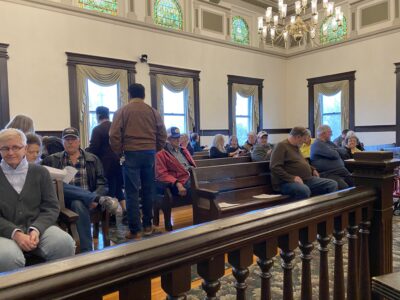Douglas County leaders approve solar farm standards, pending minor changes, after more than an hour of public comments

photo by: Austin Hornbostel/Journal-World
More than 30 people offered public comments during Wednesday's Douglas County Commission meeting, many of them opposed to large-scale solar farms being developed in the county. The commission ultimately approved standards for such solar farms and will officially adopt them via a resolution at a future meeting.
After hearing more than an hour and a half of public comments on Wednesday evening, Douglas County commissioners gave preliminary approval to a set of rules for future solar farms in the county.
The rules outline a number of limits for solar farms in the county, from how large they can be — up to 1,000 acres — to how far they must be set back from roads, homes and other structures. Commissioners voted Wednesday night to approve those standards, pending a minor technical change about grading at solar farm sites. The commission will still need to officially adopt the regulations via a resolution at a future meeting.
Commissioners voiced appreciation to the planners who spent time putting the standards together and noted their excitement for the potential of agrivoltaics — the use of land for solar energy and agriculture simultaneously. Commissioner Patrick Kelly also said he appreciated county residents for giving their input in the process.
“This is the most raw form of democracy,” Kelly said. “This is two neighbors showing up and asking another set of neighbors to make a decision on their behalf on what’s the right use of land in our communities.”
Many of the public commenters, however, said they thought large-scale solar developments weren’t the right way to use the county’s rural land.
About 20 people showed up to speak in person about the solar standards, and there were also five online commenters. Many of them said they were against approving any regulations allowing for commercial or utility-scale solar farms, but most made it clear that they were specifically opposing larger-scale developments, not solar energy in general.
Some of the commenters were against one potential development in particular: NextEra, a Florida-based energy firm, has expressed interest in developing a 3,000-acre solar farm partially located in southeast Douglas County.
Most of Wednesday night’s speakers said they live either in that area of the county or just over the county border in Johnson County, in Gardner or Edgerton. That’s the other side of the proposed NextEra project, referred to on the firm’s website as the West Gardner Solar Project.
One commenter — John Franke of Eudora — referred to the negative effect such a development could have on a currently unincorporated area called Clearfield, where a group of more than 400 residents last month filed a petition to incorporate and become a new city. Clearfield is located about 9 miles northeast of Baldwin City, and the proposed city borders are in the same area as NextEra’s proposed development.
Another commenter Wednesday night was Carrie Brandon, also of Eudora, whose name is listed as the chair of the committee to incorporate Clearfield.
Brandon distributed information to commissioners and meeting attendees on behalf of a group called Kansans for Responsible Solar, and a number of others who spoke wore matching shirts identifying them as fellow group members. During her comment time, Brandon voiced concerns about solar farms being located too close to homes, and also said she felt that solar developers needed to be more transparent about how they disclose their desire to develop in an area.
“We need regulations, state laws, that require energy companies to notify the county upon the moment they sign the first ground lease with any participating landowner, and for that to then be published or the community to be made aware that this is going on,” Brandon said.
A smaller group voiced support for utilizing solar energy in general, and about three or four speakers said they’d already entered land agreements with NextEra in anticipation of a future project.
Kelly said that even once the regulations had been finalized, county residents would still have the chance to make their voices heard. He said the discussions about solar energy in the county were far from over.
“Don’t stop being engaged,” he said. “This isn’t over in any way — we need you to stay engaged when the first application comes and we need to talk about what we want industrial solar power to look like in Douglas County.”
In other business, the commission:
• Approved language for a ballot question about whether to increase the number of County Commission districts from three to five. The question will appear on the Nov. 8 general election ballot.
• Approved nine grant recommendations, totaling $200,000 in funding, submitted by the Heritage Conservation Council for the 2022 Natural & Cultural Heritage Grant Program. The list of projects includes requests to help restore historic properties throughout the county; host community celebrations stemming from traditional Mexican and Central American festivities; and document letters from the first students to attend Haskell Institute in the 19th century, among other projects.







